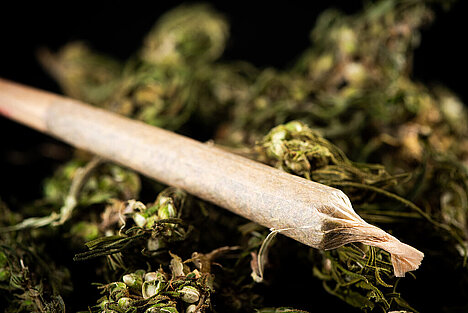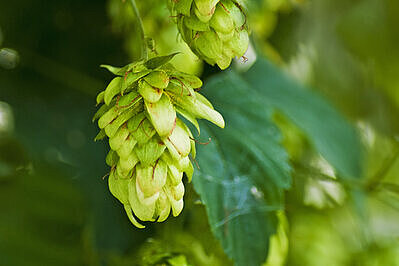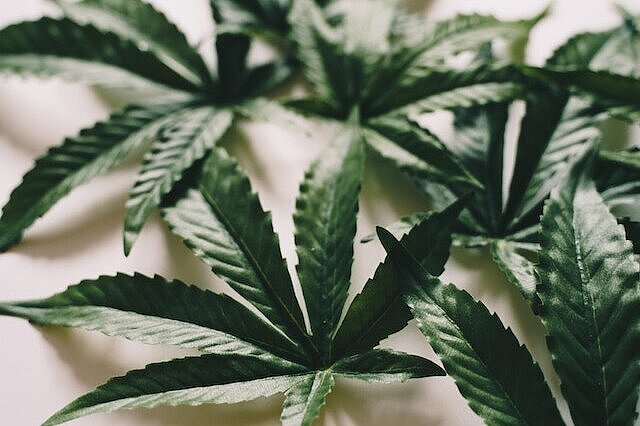Marijuana

What is marijuana?
Marijuana is the common name for the dried flowers and leaves of the female hemp plant (Cannabis sativa or Cannabis indica). The plant contains more than 100 different cannabinoids, of which THC is the best known and most potent. Cannabinoids are chemical compounds that bind to special receptors in the nervous system of mammals and trigger various effects.
How does marijuana affect dogs?
Like humans, dogs have an endocannabinoid system that consists of two types of receptors: CB1 and CB2. CB1 receptors are mainly located in the brain and influence perception, memory, mood and appetite. CB2 receptors are mainly found in the immune system and in the organs and have an anti-inflammatory and pain-relieving effect.
THC binds primarily to CB1 receptors and thus triggers psychoactive effects. However, dogs have a much higher density of CB1 receptors than humans, which means that they are much more sensitive to THC. This means that even small amounts of marijuana can lead to intoxication in dogs.
What are the symptoms of a dog that has eaten marijuana?
Symptoms of marijuana intoxication in dogs can vary depending on the amount, type and quality of the product. Typical signs include:
- Lethargy
- drowsiness
- Imbalance
- Trembling
- Dilated pupils
- Low blood pressure
- Low body temperature
- Salivation
- Vomiting
- Diarrhea
- Incontinence
- palpitations
- shortness of breath
- Unconsciousness
- seizures
Symptoms can occur within minutes to hours of ingestion and can last up to 72 hours.
What should I do if my dog has eaten marijuana?
If you suspect that your dog has eaten marijuana, you should take him to the vet immediately. Depending on the severity of the intoxication, treatment with activated charcoal, fluid therapy, oxygen administration or medication may be necessary. In severe cases, artificial respiration may be necessary.
It is important that you are honest and tell the vet what your dog has eaten. This will help the vet to make the correct diagnosis and choose the best treatment. You also don't have to worry about any legal consequences. The vet is bound to confidentiality and will not report your dog to the police.
Can I smoke pot in the presence of my dog?
No, you should not do that. If you smoke weed in the presence of your dog, you are exposing him to second-hand smoke, which contains THC. This can lead to unintentional intoxication in your dog, which can have serious consequences. In addition, your dog may accidentally eat your joints or other cannabis products if you leave them unattended.
If you want to consume cannabis, you should do so in a room where your dog is not present or make sure it is well ventilated. You should also store your cannabis products safely so that your dog cannot access them.
Are there benefits of marijuana for dogs?
Marijuana is not only a drug, but also a medicinal plant. Some studies have shown that cannabinoids can have positive effects on various conditions, such as
- Epilepsy
- cancer
- pain
- inflammation
- anxiety
- stress
However, this does not apply to THC, but to other cannabinoids such as CBD (cannabidiol). CBD is a non-psychoactive cannabinoid that binds primarily to CB2 receptors and has anti-inflammatory, analgesic, antispasmodic and sedative effects. CBD has no toxic effects on dogs and can be administered to them in the form of CBD oil or CBD cookies.
CBD oil for dogs is a dietary supplement consisting of hemp extract and a carrier oil such as salmon oil or coconut oil. It contains only traces of THC (less than 0.2%) and is therefore legal and safe. CBD cookies for dogs are treats that contain CBD oil and are an easy way to give your dog CBD.
CBD can help dogs with various ailments, such as
- Osteoarthritis
- joint pain
- skin problems
- allergies
- Fear of fireworks or thunderstorms
- motion sickness
- Loss of appetite
- Nausea
How do I dose CBD for my dog?
The dosage of CBD for dogs depends on various factors, such as
- Weight
- age
- Health condition
- product type
- CBD content
There is no universal dosage rule for CBD for dogs, so you should always start with a low dose and slowly increase it until you achieve the desired effect. A possible guideline is:
- 0.2 mg CBD per kg body weight for mild symptoms
- 0.5 mg CBD per kg body weight for moderate complaints
- 1 mg CBD per kg body weight for severe symptoms
You can give the CBD oil directly into your dog's mouth or mix it into their food. The effect takes effect after around 15 to 30 minutes and lasts for around four to six hours. You can give your dog CBD cookies as a reward or snack. The effect sets in after around 30 to 60 minutes and lasts for around six to eight hours.
Marijuana is dangerous for dogs and can lead to life-threatening poisoning. If your dog has eaten marijuana, you should take him to the vet immediately. Marijuana has no medical benefits for dogs, only risks.
CBD, on the other hand, is a safe and natural substance that can help dogs with various ailments. You can give your dog CBD in the form of oil or cookies, but always start with a low dose and observe the effects.
If you notice any signs of hypersensitivity or poisoning in your dog, you should see your vet immediately. We are not a substitute for a vet, but we try to be as accurate as possible. Every dog reacts differently and we recommend you get a second opinion or consult your vet if in doubt.
Stay healthy and take good care of your four-legged friend!😊
Similar to Marijuana
Hops (Humulus) are a genus of plants in the hemp family (Cannabaceae). All hop species are found in the northern hemisphere. The best-known representative of the genus is the true hop (Humulus...
Hemp is a species of the plant Cannabis sativa, which is mainly cultivated for its fibers, seeds and oils. Hemp contains only very small amounts of tetrahydrocannabinol (THC), the psychoactive...
Stinging nettles are herbaceous plants from the nettle family. They grow in Europe, Asia and North America and prefer moist, nutrient-rich locations. The best-known species are the common nettle...
Japanese knotweedis not toxic to dogs, cats or humans. It contains many valuable ingredients such as resveratrol, quercetin, rutin and vitamin C. These can have an antioxidant, anti-inflammatory and...



